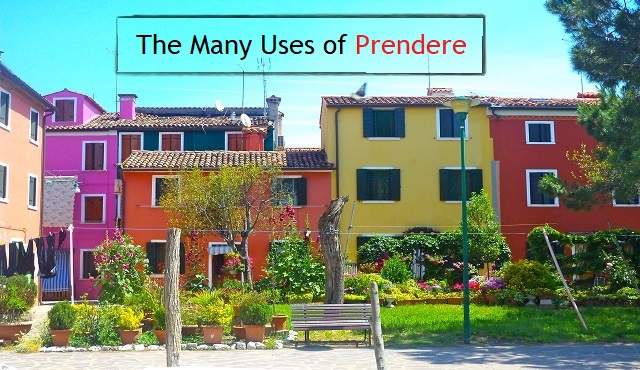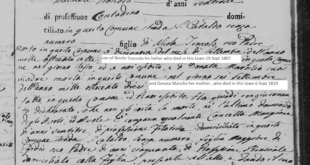Prendere most commonly means “to take,” but can also be translated as “to bring,” “to pick up,” “to get,” or “to buy/acquire.” The past participle preso can also be used to describe liking someone or something a lot. This use stretches the meaning of prendere a bit, but there is a similar expression in English — being “taken with” someone — that also expresses the same idea. In its reflexive form, prendersi is used to convey how a person can “catch/come down with” an illness.
When you are able to visit Italy, use prendere when ordering food in a restaurant to really sound like a native! Prendere is also commonly used by Italians in reference to earning money, taking medicine, or being “overtaken” by an emotional or physical condition. Finally, the Italian expressions for “to tease” and “to sunbathe” use prendere. As you can see, this verb is used in many ways in Italian!
The present tense, familiar imperative (command) tense, and future tenses of prendere have a regular conjugation, and are used frequently in daily conversation.
Prendere is also commonly used in the past tense in order to describe what we “took,” “brought,” “picked up,” “got,” or “caught.”
To describe a one-time event that occurred in the past with prendere, we will most often use the helping verb avere (to have) with the irregular past participle preso. For conversation, we will focus on the io and tu forms. We can begin a statement with the io form, such as,“Ho preso….” for “I took…” We can ask questions with the tu form by simply stating, “Hai preso…?”
In the expressions that describe the subject “liking,” or “being taken with” a person or a thing, essere (to be) is used as verb that links the subject with the past participle preso.
The passato prossimo for the reflexive verb prendersi needs the helping verb essere, as do all reflexive Italian verbs. Remember to leave out the subject pronoun io when you want to say, “Mi sono preso un raffredore ieri.” (“I caught a cold yesterday.”)
And, of course, when using essere as the helping verb with prendere, remember our usual rule for past participles: if you are female, or your subject is a group of people, make sure to change the past participle preso to presa, presi, or prese!
Examples follow below for the many ways to use the Italian verb prendere:
1. Use prendere to describe the act of “taking,” “bringing” or “picking up” something
- In order to direct someone to take something and put it in a different place, use prendere. This includes when the object is on the ground or resting on another object, and you must literally “pick it up” from that place.
- When directing someone to take something in Italian, it is important to use the command form of prendere, which has the same “i” ending as the tu form in the present tense. (To use the familiar command form, just use the present tense subjunctive mood ending. The familiar command form will not be used in our examples, but more information can be found at Italian Subjunctive (Part 7): Italian Subjunctive Commands).
- Remember that for events in the recent future, Italians use the present tense. To emphasize that something will happen for sure in the recent future or well into the future, use the future tense.
- Notice that in the past tense we must use avere as the helping verb with the irregular past participle preso to describe what we “took,” “brought,” or “picked up.”
| “Prendi quella roba che nessuna voglia e metterla lì!” |
| “Take that stuff that no one wants and put it there!” |
| “Prendi il vino alla tavola per cena!” |
| “Take/Bring the wine to the table for dinner!” |
| “Quando faccio la spesa domani, prendo la tua macchina. Non voglio camminare con troppi bagagli pesanti. |
| “When I go grocery shopping tomorrow, I (will take) your car. I don’t want to walk with so many heavy bags. |
| Prenderò tante cose alla famiglia quando viaggerò in America in cinque anni. |
| I will take many things to the family when I travel to America in 5 years. |
| “Prendi il piatto che tu hai lasciato cadere per terra! |
| “Pick up the plate that you let drop on the floor!” |
| “Prendo tutta la spazzatura nella tua stanza e buttarla via domani.” |
| ” I will pick up all the garbage in your room and throw it out tomorrow.” |
| “Hai preso il vino a nonna per la cena?” |
| “Did you take the wine to grandma for dinner ieri?” |
| “Si, ho preso una buona bottiglia di vino specialmente per nonna ieri sera.” |
| “Yes, I took/brought a nice bottle of wine especially for grandma last night.” |
2. Use prendere to describe “picking up” someone
- Use prendere with the verb passare when you want to “pass by” and “pick someone up.” As we’ve already seen in our blog about passare, these two verbs are combined to make the important every day expression “passare a prendere,” which means “to pick (someone) up.” The reference now-a-days is usually to driving in a car, but the same expression could be used when taking someone on a walk.
- In the examples given below, the pronouns ti and mi are given in red to demonstrate that they are attached to the end of prendere.
| “Passerò/Passo a prenderti alle otto.” |
| “I will (pass by and) pick you up at 8 AM.” |
| Grazie! Passa a prendermi alle otto! Sto aspettando! |
| Thanks! Pick me up at eight. I (will be) waiting! |
Side note: if you want to ask someone to “pick you up” from a particular place, venire is used with prendere:
| “Può venire alla stazione a prendermi?” |
| “Can you (polite) come to the station and get me?” |
3. Use prendere when describing what food you would like to order/eat
| “Prendo un piatto di spaghetti per il primo piatto.” |
| “I will take (have) a plate of spaghetti for the first course.“ |
| “Stammatina prendo un buon caffè prima di andare al lavoro.” |
| “This morning I will take (have) a good (cup of) coffee before going to work.” |
| “Dai, prendi l’ultima fetta di pane!” |
| “Come on, take the last slice of bread!” |
| “Che cosa vuole prendere per dolce, signore?” |
| “What would you like to have (take) for dessert, sir?” |
4. Use prendere to describe the act of taking medicine
“Devo prendere una pillola ogni mattina per l’ipertenzione .”
“I have to take one pill every morning for hypertension.”
5. Use prendere to describe buying, acquiring or earning something
| “Ho preso un chilo di mele ieri dal fruttivendolo in piazza.” |
| “I bought a kilogram of apples yesterday from the fruit vendor in the piazza.” |
| Lui ha preso la casa per pochi soldi la settimana scorsa. |
| He aqcuired (bought) the house for very little money last week. |
| “Ho preso cinquanta euro al lavoro iera sera.” |
| “I earned 50 euros at work last night.” |
| Lui non ha preso molti soldi l’anno scorsa a vendere le scarpe. |
| He did not earn much money last year selling shoes. |
6. Use the past participle preso with these expressions to describe liking something or someone a lot.
- The phrase “Sono preso da…” is similar to the phrase “Sono innamorato di…” and conveys the ideas of “I really like/I’m in love with…”
- Other Italian expressions that describe the different ways we can like someone are: “Sono cotto di…” ” I have a crush on…” and “Sono colpito da…” “I am impressed with..”
- Notice that some of these phrases take the conjunction da, while others use the conjunction di.
- To form the past tense for these phrases, we must add the past participle of essere, which is stato, and change the ending of stato to (a,i,e) as necessary to reflect the gender and number of the subject.
| “Sono preso(a) da questo libro.” |
| “I like this book a lot.” (I am really taken with this book.) |
| “Sono preso(a) da te.” |
| “I like you a lot!” (“I am really taken by you!”) |
| “Sono stato(a) preso da questo libro.” |
| “I liked this book a lot.” (I was really taken with this book.) |
| “Sono stato(a) preso da te.” |
| “I liked you a lot!” (“I was really taken by you!”) |
| “Io e Anna siamo presi molto l’uno dall’altra.” |
| “Ann and I (we) like each other very much.” |
| Anna e Michele non sono presi molto l’uno dall’altra. |
| Ann and Michael (they) don’t like each other very much. |
Side note: if you want to describe how someone or something has so enthralled or dazzled you, in effect “blinding you” literally or figuratively (abbiagliarsi) so that you make a mistake, use the expression prendere un abbaglio.
| “Ha preso un abbaglio.” |
| “I made a mistake.” |
7. Use prendersi to describe getting sick, as in “catching a cold,” or “coming down with” an illness
- Remember the Italian use of reflexive verbs to indicate “to get” in English. If you would like to review this topic, check out our blog How to Say “To Get” in Italian.
| “Mi sono preso un brutto raffredore improvvisamente.” |
| “I caught a bad cold all of a sudden.” |
| “Mi sono preso l’influenza ieri.” |
| “I came down with the flu yesterday.” |
8. Use prendere to describe “being overtaken” by an emotion or sickness, and prendersela when offended/angered
| “Sono stato preso(a) da un grand tristezza quando ho incontrato il mio amore perduto.” |
| “I was overtaken by a great sadness when I met my lost love again.“ |
| Me la sono presa con te ieri sera durante la riunone! |
| I was offended by you last night during the meeting! |
9. Two more common phrases that use prendere
| Prendere in giro = to make fun of, to tease |
|
Mio fratello maggiore mi prende sempre in giro. Non mi prendere in giro! (negative command)
|
| Prendere il sole = to sunbathe |
| Oggi prendo il sole sulla spiaggia per tutta la mattina. Today I will sunbathe on the beach all morning. |
Remember how to use the Italian verb prendere in conversation
and I guarantee you will use this verb every day!
 Fra Noi Embrace Your Inner Italian
Fra Noi Embrace Your Inner Italian







